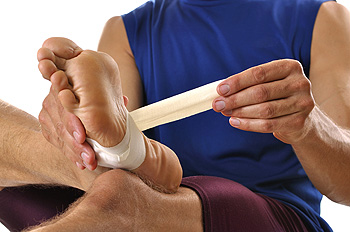 Foot wounds are described as deep tissue being exposed on the feet when the outer skin is damaged. Wounds are also referred to as ulcers. Some groups of people are more susceptible to having wounds on the feet than others. These people typically have diabetes, neuropathy or vascular disease. If you have one or more of these ailments, be sure to check your feet regularly. People also experience wounds from wearing ill-fitting shoes, staying in bed for long periods of time, or incurring an injury. Indications of the presence of an ulcer include drainage, odors, and inflammation. It is imperative to treat a wound early in order to prevent an infection from potentially forming. If an infection materializes, antibiotics or surgery may be necessary. If you believe you have a wound in the foot or ankle area, be sure to see a podiatrist to obtain the proper treatments.
Foot wounds are described as deep tissue being exposed on the feet when the outer skin is damaged. Wounds are also referred to as ulcers. Some groups of people are more susceptible to having wounds on the feet than others. These people typically have diabetes, neuropathy or vascular disease. If you have one or more of these ailments, be sure to check your feet regularly. People also experience wounds from wearing ill-fitting shoes, staying in bed for long periods of time, or incurring an injury. Indications of the presence of an ulcer include drainage, odors, and inflammation. It is imperative to treat a wound early in order to prevent an infection from potentially forming. If an infection materializes, antibiotics or surgery may be necessary. If you believe you have a wound in the foot or ankle area, be sure to see a podiatrist to obtain the proper treatments.
Wound care is an important part in dealing with diabetes. If you have diabetes and a foot wound or would like more information about wound care for diabetics, consult with one of our podiatrists from Livingston Footcare. Our doctors will assess your condition and provide you with quality foot and ankle treatment.
What Is Wound Care?
Wound care is the practice of taking proper care of a wound. This can range from the smallest to the largest of wounds. While everyone can benefit from proper wound care, it is much more important for diabetics. Diabetics often suffer from poor blood circulation which causes wounds to heal much slower than they would in a non-diabetic.
What Is the Importance of Wound Care?
While it may not seem apparent with small ulcers on the foot, for diabetics, any size ulcer can become infected. Diabetics often also suffer from neuropathy, or nerve loss. This means they might not even feel when they have an ulcer on their foot. If the wound becomes severely infected, amputation may be necessary. Therefore, it is of the upmost importance to properly care for any and all foot wounds.
How to Care for Wounds
The best way to care for foot wounds is to prevent them. For diabetics, this means daily inspections of the feet for any signs of abnormalities or ulcers. It is also recommended to see a podiatrist several times a year for a foot inspection. If you do have an ulcer, run the wound under water to clear dirt from the wound; then apply antibiotic ointment to the wound and cover with a bandage. Bandages should be changed daily and keeping pressure off the wound is smart. It is advised to see a podiatrist, who can keep an eye on it.
If you have any questions, please feel free to contact our office located in North Brunswick, NJ . We offer the newest diagnostic and treatment technologies for all your foot care needs.

 (732) 246-1377
(732) 246-1377



